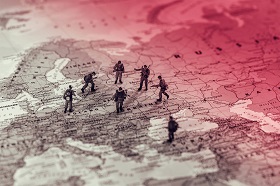Concepts of Uncertainty and the Collision with Reality
In
Login if you are already registered
(votes: 3, rating: 5) |
(3 votes) |
Doctor of Science, Professor, Head of the Department of European law, MGIMO-University
Dr. of Political Sciences, Head of Black Sea and Mediterranean Studies Centre, Institute of Europe, Russian Academy of Sciences; Professor, Higher School of Economics National Research University (HSE University)
Late 2017 was particularly rich in meetings, discussions and conferences, including such momentous occasions as the conference celebrating the 30th anniversary of the Institute of Europe of Russian Academy of Sciences, the 10th Eurasian Economic Forum in Verona, the annual London Conference at the Royal Institute of International Affairs, the 4th BRICS Legal Forum (held in Moscow) and the 7th Annual International Conference on Comparative Law. We attended the events either as moderators, or as keynote speakers. And everywhere we went, every presentation and comment was accompanied by a peculiar refrain claiming that the world is now dominated by uncertainty. Uncertainty rules everywhere: in global politics and economics, in the domestic and foreign policies of individual states, and in legal proposals that are being put to vote. However, when people keep talking about this “uncertainty” as an apparently self-evident fact, doubt inevitably starts to creep in.
Late 2017 was particularly rich in meetings, discussions and conferences, including such momentous occasions as the conference celebrating the 30th anniversary of the Institute of Europe of Russian Academy of Sciences, the 10th Eurasian Economic Forum in Verona, the annual London Conference at the Royal Institute of International Affairs, the 4th BRICS Legal Forum (held in Moscow) and the 7th Annual International Conference on Comparative Law. We attended the events either as moderators, or as keynote speakers. And everywhere we went, every presentation and comment was accompanied by a peculiar refrain claiming that the world is now dominated by uncertainty. Uncertainty rules everywhere: in global politics and economics, in the domestic and foreign policies of individual states, and in legal proposals that are being put to vote. However, when people keep talking about this “uncertainty” as an apparently self-evident fact, doubt inevitably starts to creep in.
Unexpected Twists in the Development of the United States and other Countries
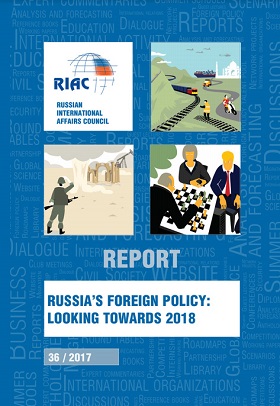
“Russia’s Foreign Policy: Looking Towards 2018”
Uncertainty as a global phenomenon starts with Donald Trump’s victory at the U.S. presidential elections. The first significant foreign political initiatives of the new president were particularly eye-catching, and they held a great number of surprises for the United States’ partners. They included uncompromising demands that the United States’ allies “pay” for the nuclear shield and thus their security, the withdrawal from the Trans-Pacific Partnership that Barack Obama had worked so hard to achieve, the backing out of the UN Paris Climate Accord, the announcement that the U.S. embassy in Israel would be relocated from Tel Aviv to Jerusalem, and many others. [1, 2] No less surprising was the fierce confrontation within the U.S. establishment, the likes of which was unimaginable just a short while ago, as was the transfer of many powers traditionally vested in the president’s administration to Congress.
The results of the Brexit vote dealt a similarly powerful, albeit more localized blow to the forecasting abilities of the political and expert community. Rational inhabitants of the United Kingdom sending their inborn common sense packing and depriving themselves of the advantages afforded by membership in an integration structure was something no one in their right mind could imagine. Nevertheless, Brexit became a reality, and London started negotiations with Brussels, where the United Kingdom would be the inevitable loser; under no circumstances will London emerge as a winner from those talks.
What followed was the amazing political experiment with Emmanuel Macron and his “Forward, Republic!” movement being promoted to the top political roles in France. The experiment resulted in virtual collapse of France’s traditional political system. Then Prime Minister of Japan Shinzo Abe gained an entirely unwarranted absolute majority in parliament, giving him carte blanche to steer any domestic and foreign political course he chooses, including abolishing the remains of pacifism enshrined in the Constitution of Japan. [3, 4, 5, 6] Then followed the transformation of Germany from the hope and stronghold of the European Union into a political swamp that for the longest time was unable to produce a stable ruling coalition, something that no self-respecting democracy could allow [7]. Finally, just as Spain had become a successful state once again, problems in Catalonia began to resurface, which are capable of plunging Spain into a political and economic chaos that could subsequently engulf the entire EU [8].
For a complete picture, add to that the “Damocles Sword” that the Trump Administration has hung over the world economy by making bold statements that the United States will now pursue only its own interests in global trade without sparing any thoughts for others. [9] The Cold War containment policy made a triumphal comeback to the global political stage. This time, it is aimed against the allegedly non-systemic Russia and China; overnight, this policy has deteriorated into a game played by Rafferty’s rules. The so-called restriction measures arbitrarily called “sanctions” imposed with and without reasons put the world on the brink of “war of all against all.” Then there is the inability of global and regional powers to form a united front in the fight against international terrorism, which uniquely enables terrorism to spread not only throughout the Middle East, but also in Africa, Asia, and even Europe and transform from a foreign threat into a domestic one for many countries. [10]
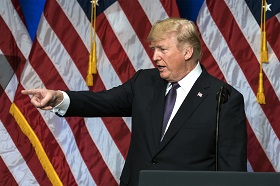
Is America First?
If all these trends and phenomena are, indeed, unexpected, unpredictable and appear out of the blue, it means that all formerly influential academic and research centres and polling institutions have discredited themselves, that they should be shut down, and we should place all ours hopes with the Lord, because living under such circumstances – acting, planning, forecasting – is entirely impossible. This shocking list is happily touted not only by sensation-prone global media, but also by academic centres. However, if we look at it from a stance that differs from the much-promoted concept of all-pervasive uncertainty, then we get a rather different picture.
The global political and expert community clearly missed the tectonic shifts in the voter sentiments, a change of sorts in the psychological makeup of a significant part of modern civil society. The people of the United States, the United Kingdom, Germany and other countries simply became tired of having the wool pulled over their eyes. People began to get the “feeling they had been forgotten” and they wanted truth [11]. They wanted politicians to follow through with their promises, and not simply make them for show. They wanted policies that they would not be ashamed of, policies that they had voted for and could be happy with. They wanted leaders who would treat them as their equals and make decisions based on their opinions, and not behind their backs. So the victories of Donald Trump in the United States, Emmanuel Macron in France, pro-Brexit voters in the United Kingdom, extreme right-wingers and nationalists in Switzerland, Austria, etc. are not accidental; they manifest the profound changes that have taken place in American and European societies over the last decade [12].
The Impasse
It may appear paradoxical at first glance, but the United States, Russia, the European Union and China are all similar to each other, not due to their (sometimes deserved) claim to the role of great powers, but to their being in similar impasses.
The United States has started to lose its unquestionable global leadership on an entire range of issues, although under no circumstances is it ready to concede this fact. The country has accumulated tremendous military power and superiority, which of course costs a pretty penny. For instance, around 240,000 U.S. troops are currently stationed in 172 countries [13]. However, the United States is unable to profit from this. Bloody, expensive interventions in Afghanistan, Iraq, Libya and essentially in Syria conducted at the behest of United States or with its participation have produced no positive results for the country. The United States does not know how to remove Russia’s nuclear threat. It cannot bring Iran to heel, fails to make the European Union and many others to follow strictly in its wake, and has been unable to force the “puny” North Korea to submit to its demands. [14]
The entire global financial system hinges on the U.S. dollar. The United States has a fantastic tool of global domination in the form of the money printing press. However, there is a flip side to everything. The United States lives above its means, at the expense of the rest of the world that “sponsors” it. The U.S/ sovereign debt alone is mind-boggling $10 trillion; add to that private capital, household and local authority debts and the figure skyrockets to $60 trillion. Trillions of dollars printed in recent years dissolved in the costs of stocks and shares instead of going to the real sector of the economy. As a result, any push may send the overvalued market into a lengthy adjustment period, which will entailing a domino effect and the large-scale collapse of banks and other financial and non-financial corporations.
China draws in a disproportionately large share of global investment. Due to the undervalued yuan and dumping policies, it rules the roost on the U.S. domestic market, as well as on other markets where the United States would like to call the shots. Germany has a multi-billion surplus in its trade with the United States, not because German-made goods are better, more reliable or of better quality, but because the euro is far “lighter” than the Deutsche Mark would have been had Bonn/Berlin not created the Economic and Monetary Union and the Eurogroup on conditions that are extremely favourable for Germany – conditions which Germany is never going to alter. [15] NATO allies prosper by attaching themselves to the military power of the United States without bearing any economic or financial burden.
In response, Donald Trump has succeeded in getting the main thing done: he had enacted a radically new, revolutionary tax law, halving corporate tax and introducing compensatory payments for access to the American market, which means that the centre of the global economy will now inevitably move to the United States once again. Many, if not all major market actors will rush to transfer their headquarters to the United States. A new era in global trade has been ushered in [16]. So it would be wrong, as many analysts inclined to, to underestimate either what Donald Trump has already achieved, or his determination to steer his own course (even under the threat of impeachment, should the Democrats control both houses).
A Downtrodden Boar
Russia seems to be in an entirely different situation, yet it is at a similar impasse. The unexpected collapse of the USSR, the breaking of traditional economic ties, the lack of initial capital and experience of a market economy, and the betrayal by western partners whom the new ruling pro-democratic elites had counted on so heavily caused a crisis that was tremendously deep. [17] On the road of transformation, Moscow lost so much military and economic power and political and ideological influence that both the collective West and its neighbours in Greater Eurasia no longer took the country seriously.
Hence the Russian operation in Syria, which is not accidental, unexpected or unpredictable; on the contrary, it is quite logical. Moscow has increased the number of forces loyal to it both at the regional and global levels. It has made a triumphant geopolitical comeback and demonstrated its growing power, forcing people to pay attention to Russia once again. Now geopolitical projects that Moscow is implementing or just considering are now seen as both promising and feasible.
Currently, there are two such projects. The more moderate, yet specific and tangible one is to strengthen the Eurasian Economic Union, achieve deeper integration with its member states, and increase its scope by concluding agreements on free trade zones and/or reducing administrative barriers. Currently, work is under way on agreements with Vietnam and China, and in future, with India, Egypt, Iran, Israel and dozens of other states. A more ambitious project is the creation of a Comprehensive Eurasian Partnership we lovingly refer to as ComEuPart. [18]
There are no doubts that Russia will continue on this course in the foreseeable future. In order to cope with the global role it claims, however, Russia will necessarily have to implement deep socioeconomic reforms. Russia should nix the “kickback” economy that has emerged in the country, carry out denationalization and real deoffshorization, guarantee everyone real (rather than imaginary) economic freedom, create a financial platform that is independent from both the West and the East, and offer all businesses access to “long-term money.” What is more, Russia should finally define its economic priorities and engage in effective economic planning within its own borders and also within the EAEU and ComEuPart.
A Fortress under Siege
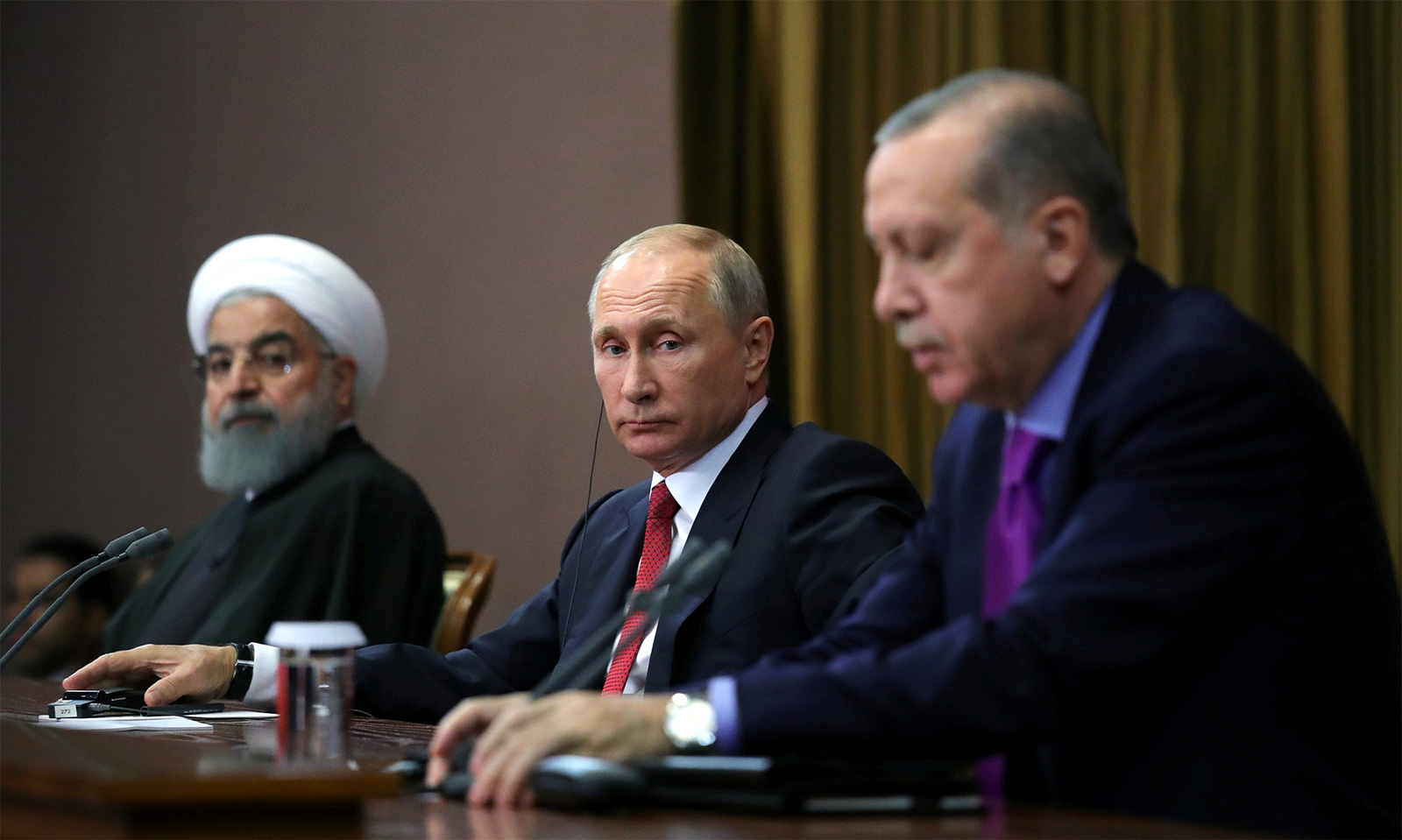
War of Interests for Peace in Syria
The European Union is in a similar predicament. It pursues a course of entrenching its achievements, ramping up internal solidarity and deepening integration, and this course has no alternatives. The last decade has shown that this course is far from ideal. It does not eliminate development gaps; on the contrary, it further exacerbates the problem and makes it unsolvable. It does not promise victory in competition with the United States and rapidly growing economies. It does not guarantee stability, continuing prosperity, security or the weakening of “Euro-scepticism.” It does not allow a solid barrier to be put up in the way of rising nationalism, populism and the extreme right; quite the opposite, it transforms them from once non-systemic and marginal forces and political movements into an integral part of modern western society.
At the same time, this is the only possible course for the European Union. Brexit has clearly shown this. The decision to withdraw from the European Union weakened the position, not so much of the union itself, which has yet to feel the impact, but rather of the “prospective deserter.” [19] It turned out integration had gone too far to back out of it now. Withdrawing from integration has a price tag that is too high. The withdrawal procedure is also very hard: any country that initiates this procedure loses far more than it gains.
What the European Union will clearly fail to do in the coming decade is fit into the planet’s changing demographics. The number of Europeans are shrinking, meaning that the pressure put on them will only increase with time. The migration crisis has cut off any opportunity to work out a new vision. Due to the increasing discontent of the indigenous population and the inability to absorb even small numbers of refuges and migrants from other cultures, the European Union chose the only currently possible course of action, one that inevitably leads to a dead-end: to block off the flow of migrants with a high, preferably insurmountable wall.
Ratcheting up
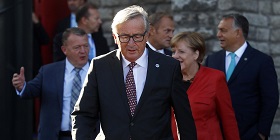
European Union Is Back in the Game
Having become the biggest economy in the world, China cannot allow anyone to conduct containment policy with impunity, attempt to meddle in its internal affairs (including those China itself believes to be internal) or engage in destabilizing countries and regions in which China has a vested interest. This is why China will rapidly convert its enormous economic potential into military power, create reciprocal containment forces, and invest in space and other dual-purpose programmes.
As far as economic construction is concerned, China’s next steps are not only easy to calculate, they are carefully set forth in the directives of the Communist Party of China, in speeches and initiatives of the country’s political leadership. [20] China is faced with the classic situation of overproduction, when insufficient domestic demand may only be compensated through foreign demand. However, following the recipes pushed onto China from abroad and following the standard western model of boosting domestic demand is futile, and even lethal for China. On the one hand, it will cause discontent and reflect badly on the authority of the party and the government and increase tensions in the society. On the other hand, it will deal a blow to China’s competitive edge and undermine its high growth rates.
Consequently, Beijing needs to: find foreign contracts for its plants; move non-critical manufacturing to other countries and regions (both neighbouring countries and those further afield); invest heavier into human capital, science and technology; master high-tech and cutting-edge manufacturing; continue foreign expansion; remove barriers blocking the entry of Chinese goods and services into foreign markets; fight any manifestations of protectionism by third countries; spare no efforts on expanding the range and geography of payments in Chinese yuan; and fight for the global recognition of its technical standards and quality guarantees.
Shaping comprehensive free trade zones, the Silk Road Economic Belt (SREB) project, entering the markets of Asia, Africa, and Latin America, and also those of Eastern Europe and the Balkans, plans to achieve global leadership in the digital and green economies fit with these purposes perfectly [21]. This is the road China will travel. As Financial Times analysts warn, China, unlike the collective West, has a long-term strategy, something that is “lacking” in the West [22].
The Realities of the Technological Revolution in the Post-Truth Era
Some of the unquestionable trends in global development are the growing population, the revival of traditional religions, Islam gaining certain features of passionarity, sub-state entities acquiring a greater role in international relations, international terrorism transforming into a mercilessly exploited factor of domestic and foreign policies, the shifting emphasis to cyber security, rapid technologicl progress, the global economy’s gradual transition to a new technological platform, etc [23]. For years to come, all these regularities of today’s development will determine the way of life of our countries and peoples, the domestic and foreign policies of all states.
The concepts of total, all-pervasive uncertainty work hard to shift emphases from that list to other things, glossing over the determining significance of these trends. It means that the emergence of such concepts and their rapid-fire spread and taking root have certain objective foundations. Let us try to point out the crucial constituent elements of these foundations, elements that do, to some extent, explain what stands in the way of a calm, rational and professional discussion and understanding of the processes under analysis and the problems they generate, an of the unfolding international cooperation with the broadest base, the kind of cooperation intended to achieve the timely and constructive resolution of all those problems.
Over many years, the United States, the European Union and aligned countries formed a sort of an industry of praising their system, their actions, their policies and the values they promote. This industry was created by research centres those countries fostered. The countries themselves proclaimed these centres to be the most knowledgeable, authoritative and infallible. These centres do nothing but lavish praise on the countries in exchange for generous financing and payments for intellectual services.
The customer, that is, the leadership and the ruling elites of the United States, the European Union and aligned countries, have no desire at all to change anything in the theoretical foundations of their supremacy, of the dominance of their model of socioeconomic development palmed off as the paragon to be imitated. The change would mean to accept reality, the objective nature and logic of the changes they abhor. They proceed from the unshakeable conviction that everything will go back to the way it used to be and they will be “on the roll” again. Consequently, they are quite content with the concepts of uncertainty that claim that current bifurcations are but a temporary deviation from the norm and are, therefore, incomprehensible and unpredictable.
When the world is in a state of dynamic change, when crisis phenomena are accumulating, when disasters strike, when the world is in the period of transition and risks are skyrocketing, these concepts of uncertainty appear amazingly apposite and seem to reflect perfectly what is going on. However, clearheaded researchers and politicians should see that they are necessary and advantageous primarily for those who would like to hold on to their discretionary powers, who need to justify their filibusterism, all-permissiveness and arbitrary policies, who place their own interests above the interests of equal and mutually profitable international cooperation, for those who are willing to reach their ends at any cost. Clearheaded researchers and politicians must remember that science is different from political alchemy and propaganda in that science is capable of discerning the regularities and logic of a given political course behind the flurry of incidents and accidents. Science is different in that it uses its knowledge of regularities to predict events, possible measures and countermeasures that the proponents of uncertainty palm off as a chain of accidental happenings, something entirely unpredictable and unexpected.
1. Boris Smirnov. Is CO2 to Blame for the Greenhouse Effect? Even a 10-Degree Change in the Global Temperature will not Destabilize the Atmosphere. // Nezavisimaya Gazeta, 284 (7191), NG-Nauka, December 27, 2017, p. 9, 12.
2. Andrey Melnikov. Trump Will not Touch What Is Sacred // Nezavisimaya Gazeta, 278 (7185), NG-Religia, December 20, 2017, pp. 9–10.
3. Robin Harding, Abe Wins Sweeping Mandate for Reform in Decisive Japan Election // Financial Times, October 23, 2017, p. 1; Robin Harding, Abe Triumphs after Koike Makes Disastrous Mistake // Financial Times, October 23, 2017, p. 6.
4. Richard Lloyd Parry, Abe Admits He Lacks the Strength to End Pacifism // The Times, No. 72362, October 24, 2017, p. 34. 1.
5. Vladimir Skosyrev. Abe Did Not Give Up on the South Kuril Islands. // Nezavisimaya Gazeta, 278 (7185), December 20, 2017, p. 1, 7.
6. Philippe Mesmer, Confortable majorité parlementaire pour le premier ministre japonais, Le Monde, 24 octobre 2017, p. 6.
7. The Results of 2017. The World. Germany is Left without a Government. Germany Sets Record in Time Taken to Form Government. // Nezavisimaya Gazeta, 285 (7192), December 28, 2017, p. 6.
8. The Results of 2017. Catalonia Attempts to Secede from Spain // Nezavisimaya Gazeta, 285 (7192), December 28, 2017, p. 6.
9. John Mauldin, Year of the Octopus, Part 1, Thoughts from the Frontline, Mauldin Economics, January 5, 2018.
10. In particular, in Afghanistan – Vladimir Mukhin. Russia is Rapidly Ramping up Military Aid to Tajikistan. After their defeat in Syria, Islamist militants move to Central Asia. // Nezavisimaya Gazeta, 278 (7185), December 20, 2017, p. 2.
11. Trump un an après (Editorial), Le Monde, No. 22652, 10 novembre 2017, p. 23.
12. Entretien avec Sebastian Kurz: “Nous devrons d’être proeuropéens”. Le futur chancelier autrichien, Sebastian Kurz, defend son projet de coalition avec le parti d’extrême droite FPO, Le Monde, No. 22652, 10 novembre 2017, p. 8
13. America’s Forever Wars (Editorial) // The New York Times International Edition, October 24, 2017, p. 10.
14. The Results of 2017. Wars and Militaries. North Korea Invades the Nuclear Powers Club. North Korea Can Now Deliver a Nuclear Strike against any Target in the U.S. // Nezavisimaya Gazeta, 285 (7192), December 28, 2017, p. 10.
15. Richard Hilmer. The United States of Europe? Social Scientist Richard Hilmer on whether Euro-Integration Should be Maintained. IPG – International Politics and Society, December 27, 2017.
16. See, for instance: Anthony Zurcher, Donald Trump Faces tough January Tests, BBC News, January 3, 2018.
17. Some of these points are cast into stark relief by Russian analysts; see, for instance: Nikolay Rabotyazhev. Why is Capitalism a Failure in Russia? Radical Market Reforms Started 25 years ago // Nezavisimaya Gazeta, December 4, 2017, p. 5.
18. Mark Entin, Ekaterina Entina. Gods of Dreams, or How to Transform the Dream of Greater Eurasia into a Specific Geopolitical Project // Vsya Evropa.ru, 2017, 1 (117), a href="http://alleuropalux.org/?p=14211" target="_blank">http://alleuropalux.org/?p=14211. See also: Mark Entin, Ekaterina Entina. In support of the Great Eurasia Geopolitical Project // Vsya Evropa.ru, 2016, 6 (111), a href="http://alleuropalux.org/?p=13361" target="_blank">http://alleuropalux.org/?p=13361; Mark Entin, Ekaterina Entina. The Comprehensive Eurasian Partnership: Moving Away from Reality or Back Towards It // Vsya Evropa.ru, 2016, 11 (115), a href="http://alleuropalux.org/?p=13969" target="_blank">http://alleuropalux.org/?p=13969; Mark Entin, Ekaterina Entina, The New Role of Russia in the Greater Eurasia, Strategic Analysis, 2016, Т. 40, No. 6, p. 590-604; Mark Entin, Ekaterina Entina, Russia’s Role in Promoting Great Eurasia Geopolitical Project, Rivista di studi politici internazionali, Firenze, 2016, No.3, pp. 331–352.
19. Some points from this list are elaborated in Izvestiya’s summary issue for 2017; the editorial sums up laconically, “in the outgoing year, Europe got new crises.” The World of 2017. Europe: The Year of Missed Opportunities. // Izvestiya, December 29, 2017, p. 7.
20. The results of 2017. Wars and Militaries. Beijing Establishes First Foreign Military Base // Nezavisimaya Gazeta, 285 (7192), December 28, 2017, p. 10.
21. Including not only the One Belt One Road, which is the most famous, but also the latest initiatives linked to creating “the community of humanity’s single destiny” and “transforming the global governance system.” These initiatives are described in detail in the foreign policy section of the report Xi Jinping, Secretary General of the Central Committee, delivered at the 19th Congress of the Communist Party of China // Nezavisimaya Gazeta, 282 (7189), NG-Dipkurier, December 25, 2017, pp. 9–10.
21. Alexander Lomanov. Transit without a destination. // the website of the Rossiya v global’noy politike [Russia in Global Politics] magazine. www.globalaffairs.ru, December 8, 2017.
22. Igor Subbotin. Afghanistan keeps Central Asia on its Toes. The Exodus of Jihadis from Syria and Iraq Affords Russia Room for Geopolitical Manoeuvres. // Nezavisimaya Gazeta, 282 (7189), December 25, 2017, p. 1, 6.
(votes: 3, rating: 5) |
(3 votes) |
A Forecasting Report. Summary
Russia’s Foreign Policy: Looking Towards 2018A Forecasting Report
US Sanctions against Russia: The Forecast for 2018There will be at least seven reports submitted next year, each of which will most likely provide a pretext for the further alienation of Russia and the United States from each other
What Does 2018 Have in Store for the Kremlin?Regardless of how each of us sees the world in 2018, it seems apparent that this world can no longer be explained within traditional IR paradigms
Russia's Changing Relations with the West: Prospects for a New Hybrid SystemIn 2017 Russian foreign policy started a painful process of reassessing its previous assumptions about the EU and its midterm prospects




